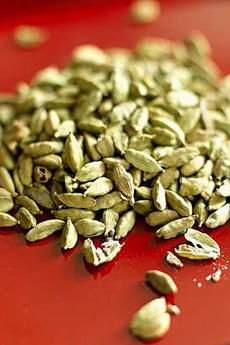Cranberry Mulled Wine Recipe
|
She uses a slow cooker: a great way to mull wine or cider without having to tend to it.
After years of serving mulled wine, we realized that the popular garnishes are wasteful: They can’t be eaten, and are tossed out. That means you, cinnamon sticks, curls of peel, raw cranberries, and star anise. So, we’ve settled on seasonal garnishes that are edible, attractive, and aromatic: Next is a slow cooker alternative (jump to it, below). Slow mulling is great because it doesn’t take up a stovetop burner that you may need for cooking. Finally, a recipe for mulled wine with vodka (jump to it, below). We adapted this classic recipe from Wine And Glue. TIP: Serve mulled wine in a glass vessel. If you don’t have glass mugs or Irish Coffee glasses, consider getting some. They’re not more than $5 apiece, and you can use them year-round for any hot beverage. Rocks glasses and stemmed wine glasses also work. Ingredients |
|
|
|
Preparation 1. COMBINE all ingredients in a large saucepan. Bring to a quick boil, then reduce to a low simmer for 10 minutes. You don’t want the alcohol to evaporate. 2. SERVE warm. If you don’t have glass cups or mugs, you can also use stemmed wine glasses or rocks glasses. We adapted this recipe from Kate at Kitchen Treaty. Ingredients 1. COMBINE the wine, orange juice, cranberries, and sugar to a 3-quart or larger slow cooker. Stir to help the sugar dissolve. 2. SCRUB the orange, stud it with cloves and add it to the pot. If you don’t have the time to insert the cloves, just toss them into the pot separately. There are two techniques to stud an orange: use a thimble on your finger (pushing in more than a few starts to dent your finger) or first make holes with an ice pick or toothpick. 3. COOK on low for 2-3 hours, until the cranberries are tender. Be sure not to boil. Remove the orange and the cinnamon sticks, then carefully pour the mulled wine through a fine-mesh sieve into a large bowl. Use the back of a large spoon to press on the cranberries and release the juices. Return the wine to the slow cooker and stir in the brandy. Taste and adjust the sweetness until it’s just sweet enough (the sweetness should be more elegant than a soft drink!). 4. LADLE into mugs, garnish as desired and serve. Keep the slow cooker on the low setting so guests can help themselves to refills. Kitchen Treaty advises that if kept on low for more than three hours, it will boil—and boil off the alcohol. |
||
|
|
RECIPE #3: MULLED WINE WITH VODKA This ingredient comes from Ocean Spray. The vodka is optional, but we highly recommend it! 1. COMBINE all ingredients except the vodka, dried cranberries and almonds in a large saucepan. Heat to boiling, reduce the heat and simmer 15 for minutes. 2. STRAIN to remove the spices. Stir in the vodka, 3. PLACE 1 tablespoon of dried cranberries and 1-1/2 teaspoons of almonds in the bottom of each glass or mug. Pour the in mulled wine and serve. According to Harvard University, the origin of the word “mull” to mean heated and spiced is shrouded in mystery. Mulling spices can include allspice, cardamom, cinnamon, cloves, nutmeg, peppercorns and/or star anise. A “mulled” drink is one that has been prepared with these spices. The same spices can be added to the brewing process to make spiced beer. The custom is believed to have originated in northern Europe to use wine that had gone bad. The spices covered up the off taste, along with additions such as apples, oranges and dried fruits, including raisins. The technique is to heat the liquids with the spices and then strain them out before serving. The expression “cup of good cheer” comes to us from Merrie Olde England, referring to hot mulled cider and wine. |
|
|
“Wassail” (WASS-ul), meaning good health, began as a greeting among Anglo-Saxons, who inhabited England from the 5th century. They comprised Germanic tribes who migrated to the island from continental Europe, and initially spoke what we today call Old English. Centuries later, the term evolved into a drinking toast. The wassail bowl tradition began in the 14th century in southern England, home to apple groves galore and a lot of apple cider. The first wassail bowls contained hot mulled cider. When you come across references to “a cup of good cheer,” it refers to mulled cider or wine. |
||






